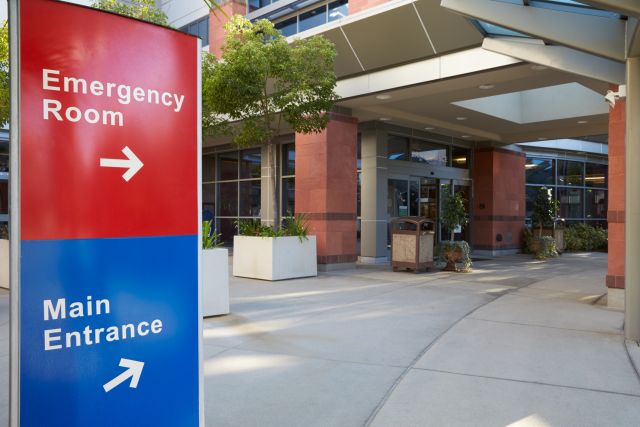Updated on October 4, 2023.
We’ve all been there. It’s late on a weeknight and you’ve got sharp stomach pain. It’s an early Sunday morning and your child tripped on the sidewalk and might need stitches. You wake up with a terrible sore throat. Could it be strep?
Where do you go for help: the ER, urgent care, or your primary care physician?
For true non-emergencies that can wait until normal office hours, it’s likely a good choice to make an appointment with your healthcare provider who already knows you and your health history. Some medical practices offer same-day, walk-in, or after-hours services, but it may not be your provider and in many cases, an on-call physician or nurse may direct you to your nearest emergency department.
If you can’t wait—your symptoms or concerns are severe or worrisome enough to warrant immediate medical attention—do you head to the ER or an urgent care clinic? What is the difference anyway?
Consider the severity of the medical issue
If you or someone else has a life-threatening injury or medical emergency, call 911 right away. The timing of treatment for stroke, heart attack, and other serious events is critical for ensuring the best possible outcome. First responders will be able to start the chain of care—administering potentially life-saving interventions and alert medical staff at the nearest emergency department. An ambulance can also get to a hospital more quickly than a car in traffic.
Signs of a life-threatening emergency include:
- Troubling breathing or shortness of breath
- Tightness or pain in the chest, neck, back, or arms
- Sudden dizziness or loss of consciousness
- Weakness or numbness in the arm, leg, or one side of the face
- Changes in vision
- Disorientation or confusion
- Slurred speech
- Difficulty walking or balancing
- Severe headache that comes on suddenly
- Seizure
- Trauma or uncontrolled severe bleeding
For other medical issues, choosing between an ER and urgent may be a tough call. It can be confusing because the terms “emergency room” and “urgent care” both imply immediacy—you go to these facilities when you have an issue that requires attention right away and can’t wait until tomorrow—or until you can get an appointment.
But an urgent issue isn’t necessarily a medical emergency. That’s one key difference. Emergency departments treat serious or life-threatening health issues. ERs are staffed with doctors, nurses, nurse practitioners, and other healthcare providers who are trained to provide emergency medical care to people of all ages. They are part of hospitals or major medical centers with access to other healthcare providers trained in various fields of medicine, including surgery, cardiology, neurology, and other specialties to address serious medical issues, such as strokes, heart attacks, allergic reactions, car accidents, and other major events. They typically also have full access to labs and imaging resources, such as MRI, CT scans and X-rays.
Urgent care facilities, on the other hand, handle medical issues that need prompt attention but are less serious and non-life-threatening. Think of these clinics as that middle ground or gray area between primary care physicians and emergency departments. Urgent care is a good choice for small wounds that need a few stitches, sprains and strains, or a straightforward illness, like a bad earache or sore throat that isn't accompanied by other severe or unusual symptoms. For example, if you think you have the flu, urgent care is a good option—if you're not experiencing signs of flu-related complications, like trouble breathing, wheezing, coughing up blood, or shortness of breath. What about suspected fractures? Minor breaks in the extremities (fingers and toes) can likely be treated in an urgent care setting, and you may receive a referral for follow up care. But breaks that puncture the skin, involve an arm or leg, the back, neck or head are more serious and should be managed in the ER.
Urgent Care clinics often have physicians, nurses, and other healthcare providers on staff, but they do not have the same access to specialists who can advise on a wide range of health issues. These facilities may have basic lab and imaging services, like X-rays, but they will often refer patients who need follow up care or more specialized treatment to the emergency department. If you arrive at urgent care complaining of chest pain, for example, the staff may do tests to determine the cause of your symptoms. But if you are having a heart attack, you will be transported to the nearest ER.
Urgent care clinics often treat an established list of conditions. Some examples of health issues that may be adequately treated there:
- Back or muscle pain
- Minor cuts and burns
- Diarrhea or vomiting
- Earache
- Sore throats
- Sinus infections
- Skin conditions, like rashes or poison ivy
- Sprains or joint pain
- Upper respiratory infections
- Urinary tract infections
If you're still in doubt about the severity of a medical issue, you can call your healthcare provider or local urgent care clinic for immediate guidance—or head to the nearest emergency room.
Consider how quickly you need medical attention
Emergency departments are staffed and open 24 hours a day, seven days a week. You can seek help for a serious medical issue at any time.
Urgent care facilities, on the other hand, have business hours. Before you go, you should check to see if it’s open. If it is, you may have a shorter wait there than the emergency room since they treat a narrower list of health issues.
If the urgent care clinics near you are not open, however, and you need medical attention right away, you can always go to the emergency room.
Consider what your insurance plan covers
A federal law called the Emergency Medical Treatment and Labor Act (EMTALA) requires emergency departments to treat or stabilize anyone with a medical emergency—even if they do not have insurance or may not be able to afford their care. Unlike hospitals, urgent care clinics are not covered under this federal mandate. Most clinics accept health insurance, but some may require payment at the time of service.
Since they tend to address less serious or complicated medical issues, an urgent care visit is likely less costly than a trip to the ER. But costs will vary from one insurance plan to the next. It’s wise to know what your plan covers ahead of time—before you’re faced with an urgent medical issue.







